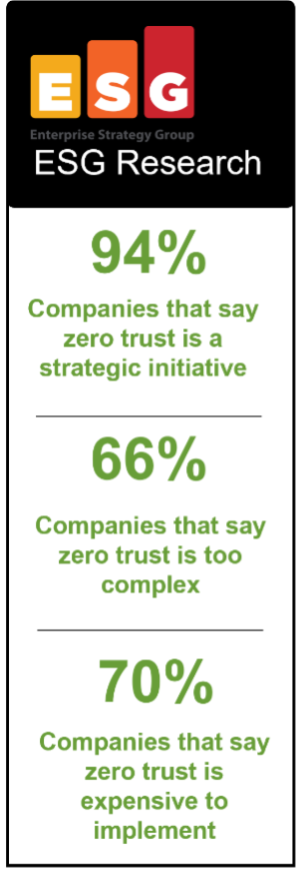
Brought to you by:
Enterprise Strategy Group | Getting to the Bigger Truth™
ESG ECONOMIC VALIDATION
Analyzing The Economic Benefits Of The Zscaler Zero Trust Exchange
By Nathan McAfee, Economic Validation Analyst
JANUARY 2022
Executive Summary

Introduction
Challenges
Figure 1. Organizations See the Value of Zero Trust but are Challenged to Implement
Please select a response that best reflects your opinion toward each of the following statements pertaining to zero trust. (Percent of respondents, N=46)
Source: Enterprise Strategy Group
The Solution: The Zscaler Zero Trust Exchange
Figure 2. The Zscaler Zero Trust Exchange

ESG Economic Validation
Zscaler Zero Trust Exchange Economic Overview
Technology Cost Optimization
“I was expecting Zscaler to eliminate most of the cost of hardware appliances. I was not expecting to see how much time this freed up for our security team. Without appliances to monitor, maintain, and update, they could spend time on much more strategic initiatives.”
Improved Operational Efficiency
“Our security teams spent quite a bit of time planning for, locating, and trying to understand incidents. With Zscaler Zero Trust Exchange, we have seen a huge drop in incidents, and the ones that do exist are fixed much quicker than before we adopted Zscaler.”
Figure 3. Zscaler Zero Trust Exchange Frees up Security FTEs to Work on More Strategic Tasks

Improved User Experience
Why This Matters
Enhanced Security Posture



“Zscaler provides quite a few operational and user experience benefits, but without rock solid security nothing else would matter. Companies that adopt Zscaler Zero Trust Exchange see their occurrences of malware, ransomware, viruses, and data breaches reduce dramatically.”
Increased Business Agility
ESG Analysis
- Number of employees – 5,000
- Number of managed devices – 8,000
- Number of locations – 34
- Annual revenue - $900,000,000 USD
- Number of security appliances (as-is state) – 200
ESG found the quantifiable benefits to fit in five categories:
| Benefit Area | Annual Benefit | 3-Year Benefit |
|---|---|---|
| Security Profile | $346,860 | $1,040,580 |
| Operational Efficiency | $172,380 | $517,140 |
| Technology Costs | $676,000 | $2,028,000 |
| End-user Impact | $2,881,667 | $8,645,000 |
| Business Enablement | $92,500 | $277,500 |
| Total Benefit | $4,169,407 | $12,508,220 |
| Cost of Zscaler | $3,000,000 | $9,000,000 |
| ROI | 139% | 139% |
The Bigger Truth
This ESG Economic Validation was commissioned by Zscaler and is distributed under license from ESG.
All trademark names are property of their respective companies. Information contained in this publication has been obtained by sources The Enterprise Strategy Group (ESG) considers to be reliable but is not warranted by ESG. This publication may contain opinions of ESG, which are subject to change from time to time. This publication is copyrighted by The Enterprise Strategy Group, Inc. Any reproduction or redistribution of this publication, in whole or in part, whether in hard-copy format, electronically, or otherwise to persons not authorized to receive it, without the express consent of The Enterprise Strategy Group, Inc., is in violation of U.S. copyright law and will be subject to an action for civil damages and, if applicable, criminal prosecution. Should you have any questions, please contact ESG Client Relations at 508.482.0188.

Enterprise Strategy Group | Getting to the Bigger Truth™
Enterprise Strategy Group is an IT analyst, research, validation, and strategy firm that provides market intelligence and actionable insight to the global IT community.
